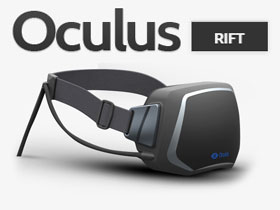Oculus VR: Just One Version of Oculus Rift for PC and Mobile
Last week, Oculus VR CEO Brendan Iribe revealed that the company's Oculus Rift would be heading to Android around the same time the technology launched for PC. However, it seems there won't actually be two separate versions of the Oculus Rift but one model that will work on both Android and PC. Speaking to Engadget, Iribe cleared up the confusion:
"We will be delivering a single Oculus Rift," he said. "We will be delivering a single Oculus Rift which is a tether to multiple different devices," he explained, adding that Oculus Rift is able to tether to Windows/Mac/Linux computers and that the company is looking into support for tethering to a mobile device.
Iribe's clarification comes after a VentureBeat piece reported that Oculus VR planned to launch mobile support as close as possible to the PC headset launch. The CEO reportedly told attendees during his GamesBeat keynote that while they're skeptical about how good virtual reality can be on mobile, what John Carmack has been able to do is 'pretty incredible.' Iribe reiterated this sentiment when speaking to Engadget. Speaking about the processing power required to make Oculus Rift happen for mobile, Iribe said he didn't think it would take Keplar because of the impressive results Carmack is getting on existing hardware.
"I think people will be pretty surprised with what set of devices we're able to make this work on. We are focused on just a few right now, basically just to stay focused so that we can deliver a great experience on a couple devices first. Then over time we'll have that span out," he told Engadget.
John Carmack Joined Oculus Rift in August of this year having supported the project right from the beginning (before it even appeared on Kickstarter). Perhaps best known in the gaming community as the co-founder of id Software and lead programmer on Wolfenstein 3D, Doom, and the Quake series, Carmack is also a pioneer of 3D graphics as well as a rocketry enthusiast. He also founded aerospace startup Armadillo Aerospace in 2000.
Follow Jane McEntegart @JaneMcEntegart. Follow us @tomshardware, on Facebook and on Google+.
Get Tom's Hardware's best news and in-depth reviews, straight to your inbox.

Jane McEntegart is a writer, editor, and marketing communications professional with 17 years of experience in the technology industry. She has written about a wide range of technology topics, including smartphones, tablets, and game consoles. Her articles have been published in Tom's Guide, Tom's Hardware, MobileSyrup, and Edge Up.
-
voodoobunny Carmack is on it. The actual artwork part of the demos may end up being awful (all drab green and brown and grey) but the underlying performance will be amazing, and then all that remains is for someone to come along and pretty it up (Quake -> Unreal again).Reply -
clonazepam brazuka331, my 27" monitor and my 46" television both work fine with my android smartphone. They are displays. They get a signal through a hdmi cable. This is a display. It will display stuff.Reply
What may or may not be awful is the content created by people to make use of this display. -
Murissokah It's good to see Carmack actually working on something useful rather than just talking about other people's stuff. The man is a legend an has contributed an awesome lot to gaming, but it has been sometime since he's done something noteworthy. I'm just fed up with people making something news because "Carmack said so".Reply -
cegli @brazuka331 "Anything that working on android and PC is guaranteed to be awful."Reply
So basically you are claiming that HDTV's and Monitors are awful, because they can be attached to both Android phones and PCs. This is exactly the same thing. I have the devkit and it's far from awful. Haven't had this much fun with technology since the N64 and internet came out.
